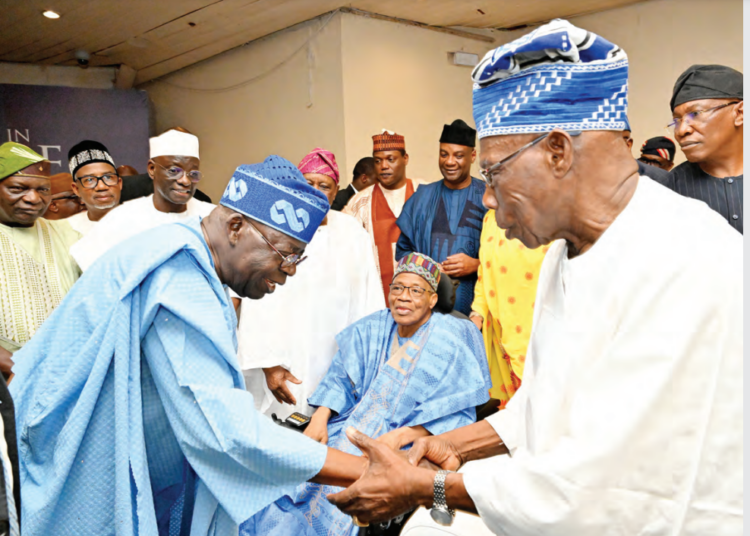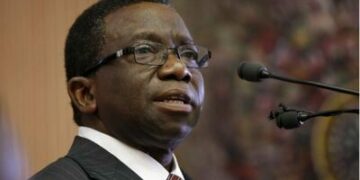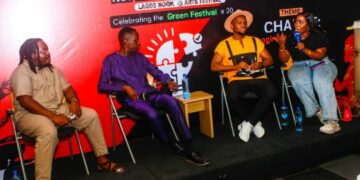Thirty-two years after the annulment of the June 12, 1993 election, former Military President Ibrahim Badamasi Babangida (IBB) has released his side of the story in the form of a book. Babangida, even though he acknowledged that Chief Moshood Abiola won the election, insisted that the annulment was in the national interest.
IBB was the military president during that election, which was widely believed to have been won by MKO Abiola. The election was annulled without the announcement of a winner.
However, 32 years after the election, Babangida has admitted that Abiola won that presidential election but that he acted to protect the country’s interests by cancelling it.
IBB stated this in Abuja on Thursday during the launch of his autobiography A Journey in Service.
“As the leader of the military administration, I accept full responsibility for all decisions I took. And June 12 happened under my watch. Mistakes, oversights, and missteps happen in quick succession. Still, I say in my book that we acted in the extreme national interest so Nigeria could survive,” the former military president told the gathering.
However, Babangida described the annulment of the election as the most difficult decision of his life.
The former military leader noted that while the annulment of the election remained a defining moment in his career, he took solace in the fact that former President Muhammadu Buhari posthumously honoured Abiola with the Grand Commander of the Federal Republic title, a recognition reserved for Nigerian presidents.
Babangida expressed regret at the annulment of the poll, which he said interrupted the return to democratic leadership.
“Our nation’s march to democracy was interrupted, a fact I deeply regret. But Nigeria survived, and democracy is still alive, a testament to our resilience and commitment to progress. This book is part of my personal story with national history,” Babangida said.
The 1993 presidential election, which many observers have adjudged as the most credible election in Nigeria’s history, has continued to intermittently dominate discussions in Nigeria.
Abiola was believed to have won the exercise. Over the years, calls for the then-Social Democratic Party (SDP) candidate to be acknowledged as the winner have continued. To honour Abiola, former President Muhammadu Buhari shifted the country’s Democracy Day celebration from May 29 to June 12 in 2018.
Thursday’s event was attended by former presidents, governors—past and present—captains of industry, and other top figures from within and outside Nigeria.
The book reviewer, former Vice President Yemi Osinbajo, said the “evil genius” and “Maradona”—as Babangida was nicknamed—answered the question of whether Abiola won the June 12 election in his book.
“Although I am on record to have stated after the election that Abiola may not have won the election, upon further reflection and a closer examination of all available facts, particularly the detailed election results which are published as an appendix to this book, there was no doubt that MKO Abiola won the June 12 elections,” Babangida admitted in his book.
“Upon closer examination of the original collated figures from the 110 polling booths nationwide, it was clear that he satisfied the two main requirements for winning the presidential election – mainly majority votes and geographical spread – having obtained 8,128,720 against Tofa’s 5,848,247 votes and securing the mandatory one-third of the votes cast in 28 states of the Federation, including Abuja.”
The return of democracy in Nigeria in 1999 followed a series of events, some bloody and undesirable. In 1993, Babangida, who took power in 1985 through a coup against General Muhammadu Buhari, midwifed the transition to civil rule that was to end with the 1993 presidential election. He would cancel the poll and resign afterwards following protests and unrest. Babangida subsequently formed an interim government with businessman Ernest Sonekan as president and Sani Abacha as Chief of Defence Staff and Minister of Defence. On November 18, 1993, three months into his administration, Abacha overthrew Sonekan in a palace coup.
The annulment of the June 12, 1993, presidential election, which was contested between Abiola of the Social Democratic Party (SDP) and his primary challenger, Bashir Tofa of the National Republican Convention (NRC), sparked protests and unrest nationwide. Abiola declared himself president because of the incontrovertible evidence of his electoral victory. He was not only denied his mandate but was subsequently imprisoned by the military regime of Sani Abacha, Babangida’s former Chief of Defence Staff.
Abiola died in suspicious circumstances in detention on July 7, 1998. He was 60 years old. One of his wives, Kudirat, was viciously assassinated on June 4, 1996, while campaigning for the revalidation of her husband’s mandate.
After Abacha’s death on June 8, 1998, General Abdulsalami Abubakar took over power and midwife the transition to democratic rule. The former head of state Obasanjo won the presidential election on the platform of the Peoples Democratic Party (PDP), signalling the democratic era known as the Fourth Republic.
Obasanjo was the first military head of state between February 1976 and October 1979 before becoming the country’s democratically elected President between 1999 and 2007.
For decades, the credibility of the poll has dominated political discussions, with the pro-democracy movement National Democratic Coalition (NADECO) and regional socio-political group Afenifere relentlessly demanding a remedy for the “injustice” done to the Abiolas and the Yoruba people of the South-West zone of Nigeria.
As a sort of remedy or compensation, in 2018, then President Muhammadu Buhari moved Democracy Day from May 29 to June 12 in honour of Abiola and to remind all Nigerians of one of the freest elections in the nation’s history. The day celebrates the ideals of democracy since the beginning of the Fourth Republic 25 years ago.
Some of the most decorated men attended the book launch, including former Presidents and Heads of State Olusegun Obasanjo, Goodluck Jonathan, Yakubu Gowon, and Abdulsalami Abubakar, as well as former Vice Presidents Atiku Abubakar, Yemi Osinbajo, and Namadi Sambo.
President Bola Tinubu and Vice President Kashim Shettima were also present. Billionaire businessmen Aliko Dangote, Abdulsamad Rabiu, and Folorunsho Alakija, among others, were also in attendance.
…I Challenged IBB – Tinubu
During his speech, President Bola Tinubu recalled how he once told the former military president, Ibrahim Babangida, that he had failed to make history.
Tinubu recalled how he confronted Babangida for always postponing their inauguration after winning the election. He said he feared he would be imprisoned for confronting the then head of state.
“Without you, people like me won’t be in politics. Your progressive revolution to say that you want young, brilliant people in politics, you inspired some of us,” Tinubu said.
“I told you that you had an opportunity to make history that day and failed to do it. Why not inaugurate us? Why are you calling us back and postponing the inauguration? They thought I would end up in jail.
You came out right at the end of the remark; you shook me. I can’t forget that,” Tinubu said amid applause.
IBB Restored My Rank, Did A Lot for Nigeria – Gowon
In his own remarks, a former Head of State, Yakubu Gowon, thanked Babangida for helping him and contributing to Nigeria’s development.
“I had a very rough time in government; I was even charged with treason,” Gowon said during the event. “Later on, President Shagari rescinded that order, and you (IBB), in the end, restored my rank and honour. You did quite a lot for the country.”
It will be recalled that in 1976, Olusegun Obasanjo, the country’s military leader, sacked Gowon from the Nigerian Army over the February 13, 1976 coup.
But in 1981, President Shehu Shagari pardoned him. Six years later, Babangida restored Gowon’s military rank and benefits.
Documenting History Is Helpful – Obasanjo, Jonathan
Former President Olusegun Obasanjo, who chaired the event, remarked that by writing his memoir, Babangida had contributed to making history and documenting it. However, he cautioned the former military Head of State to expect varied reactions to the book, including sound, bad, and ugly ones.
Like Obasanjo, former President Goodluck Jonathan also praised Babangida for writing the book, saying Nigeria’s history would be incomplete without the story of the former head of state. “So, if you contribute to the history documentation, it makes your history stronger, more relevant,” the ex-president said.
“So, today, you’re helping us,” the former Bayelsa governor told the gathering.
Soothsayer Told Us IBB Would Be President – Abdulsalami
Former military Head of State, Abdulsalami Abubakar, has revealed how a soothsayer predicted the emergence of Ibrahim Badamasi Babangida (IBB) as Nigeria’s head of state.
He said the prediction was made in 1952, 33 years before IBB became Nigeria’s leader.
“My relationship with Ibrahim has gone a long way—over 80 years,” the former head of state told the gathering.
“Ibrahim, thank you again for your friendship and brotherhood. No moment goes by when we remember our escapades without bringing smiles to our faces. May these smiles continue during our twilight.”
Narrating the prediction in front of the audience, Abdulsalami, a neighbour of IBB in Minna, went down memory lane.
“While we were growing up in the little town of Minna about 80 years ago, as far back as 1952, a soothsayer told us that IBB was going to be the head of state of this country. We never believed him. Then Captain Gowon, a young, competent officer, lured us to join the military, and when we joined the army, all we hoped was to get to the rank of captain and retire.
“God, in His mercy, propelled us to become generals, and by the grace of God, both of us later became heads of state. No moment goes by when we remember our escapades that it doesn’t bring smiles to our faces,” he said.
IBB Is Architect of Thriving Private Sector – Dangote
For his part, the president and chief executive of Dangote Industries Limited, Aliko Dangote, praised General Ibrahim Babangida for implementing policies that liberated the private sector in Nigeria during his regime.
Dangote, the largest employer of labour after the federal government, commended Babangida for his transformative policies that encouraged Nigerian investors to play prominent roles in the economy. He highlighted the abolition of import licences, which helped stimulate domestic industries. These reforms, among others, ensured that Nigeria now has more private-sector involvement than any other country in Africa. This shift, he said, led to a contribution of 85% of the country’s GDP from the private sector, while the government contributes just 15%.
“Your Excellency, I express my sincere gratitude for all you have done for Nigeria. Many may not realise that you were the architect of the private sector in Nigeria. Anyone in the private sector who has achieved prominence today owes it to you, as you provided us with the necessary licences. In the past, we used to struggle to obtain licences through intermediaries, including Indians,” he said.
IBB Raises N17.5bn at Book Launch
Nigeria’s former military president, General Ibrahim Badamasi Babangida (rtd), launched the country’s second presidential library—The IBB Presidential Library—on Thursday in Abuja during the public presentation of his memoir A Journey in Service.
The event, held at the Congress Hall of the Transcorp Hilton, not only unveiled Babangida’s much-anticipated autobiography but also served as a primary fundraising drive for the library project, raising an estimated N11.5bn to be redeemed immediately from some of Nigeria’s most prominent business and political figures.
Topping the list of donors was billionaire industrialist and philanthropist Abdul Samad Rabiu, who contributed N5bn—the largest single commitment announced at the event. He was followed by General TY Danjuma (rtd), who pledged N3bn. Both pledges are to be redeemed immediately, while Africa’s richest man, Aliko Dangote, donated N2bn at the event to be redeemed this year, with a further commitment to contribute N2bn annually over the next three years, bringing his total to N8bn. Billionaire businessman Prince Arthur Eze also supported the project with N500m.
In his remarks, General Babangida, visibly moved by the generosity of the donors, singled out Abdul Samad Rabiu for special praise, acknowledging his steadfast support from the project’s early days.
The IBB Presidential Library is designed as a national institution that will serve as a repository of Nigeria’s arts, political, and military history. It follows in the line of the Olusegun Obasanjo Presidential Library in Abeokuta, the first of its kind in Nigeria.
Former President Olusegun Obasanjo chaired the event, and former Ghanaian President Nana Akufo-Addo delivered a keynote address. The afternoon brought together some of Africa’s most notable statesmen.





